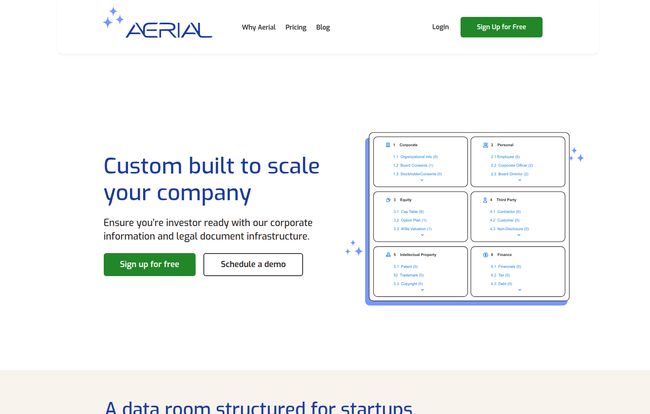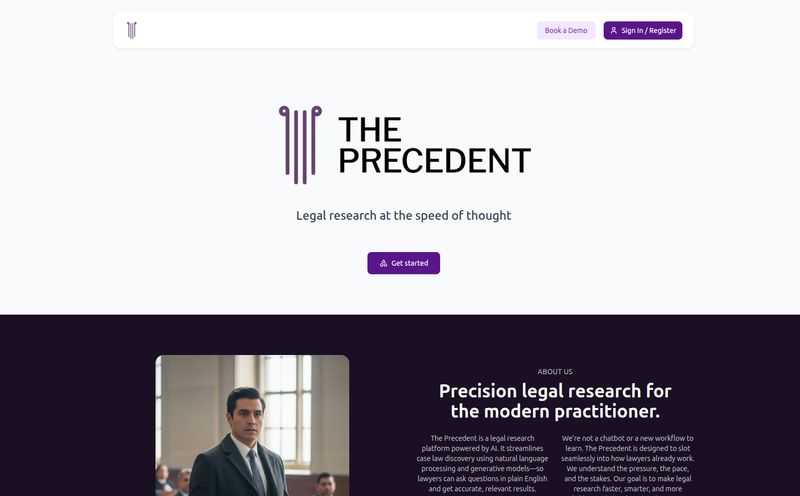If you're a startup founder, there are a few phrases that can instantly spike your cortisol levels. "We need to talk about burn rate" is one. "Our biggest competitor just raised a massive round" is another. But the true heart-stopper? It's probably an email from a potential lead investor with the subject line:
Excited to move forward - sending our due diligence checklist.
Suddenly, your world stops. Your beautifully crafted pitch deck feels like a distant memory. Now begins the great scramble—a frantic, caffeine-fueled archeological dig through years of Google Drive folders, messy Dropbox accounts, and old email threads. You're hunting for that one signed advisor agreement from 2021, the exact cap table from before the last safe note, and every single customer contract you've ever signed. It's a mess. It's stressful. And frankly, it's a colossal waste of your time.
I’ve been in and around the startup world for years, and I've seen this chaotic dance play out time and time again. It’s a rite of passage, but a painful one. So when I heard about a platform called Aerial that claims to use AI to automate this whole nightmare, my cynical marketer ears perked up. Another tool promising to solve all our problems? Sure. But this one felt... different. I had to take a look.
What is Aerial, Exactly? (And Why Should You Care?)
Okay, so Aerial isn't just another cloud storage folder you label "LEGAL STUFF." That's the first thing to get straight. Think of it more as a purpose-built, intelligent data room designed specifically for the chaos of a startup's corporate life. It's a platform built to collect, organize, and, most importantly, understand all your critical legal and corporate documents.
The homepage says it’s “a data room structured for startups, created by corporate counsel.” That part is key. It's not an engineer's idea of how legal docs should be organized; it's based on how your (very expensive) lawyers actually think and work. It automatically ingests your documents, uses machine learning to figure out what they are—an employment agreement, a vendor contract, a board consent—and then files them away neatly. It’s like having a hyper-efficient paralegal on staff 24/7, but one that you dont have to pay an hourly rate to for sorting PDFs.
The whole point is to get you from "chaos" to "investor-ready" without you having to become a part-time legal clerk. You can spend your time building your business, not doom-scrolling through files.

Visit Aerial
The Standout Features That Caught My Eye
Look, features on a landing page are one thing. But features that solve a real, throbbing pain point are another. Aerial has a few that really stand out from the typical SaaS crowd.
AI-Powered Document Sorting (Goodbye, Manual Labeling!)
I can't be the only one who has a folder named `Contracts_Final_v2_Approved_Signed.pdf`. The manual grind of naming and organizing files is not just tedious; it's where mistakes happen. Aerial’s AI-powered organization is the star of the show. You can drag and drop a heap of files into the platform, and its machine learning models get to work, reading and cross-referencing everything. It identifies key dates, parties involved, and the type of document, then automatically labels and structures it. This is not just a time-saver; it’s a sanity-saver.
The "Red Flag" Report: Your Pre-Flight Check
This might be my favorite part. Aerial proactively scans your documents and generates a "Red Flag Report." What does that mean? It looks for common issues that would make an investor's lawyer raise an eyebrow. Things like missing signatures, clauses that might conflict, or expired agreements. Finding these things yourself is tough. Having a VC's legal team find them is embarrassing and can even erode trust. Aerial gives you a heads-up, allowing you to fix potential problems before they become deal-breakers. It's like a linter for your legal code, catching bugs before you push to production.
A Data Room That Doesn't Suck
Anyone who has been through a fundraise knows the pain of a poorly managed data room. It's usually a shared folder with a confusing, inconsistent structure that makes it impossible to find anything. Because Aerial is built for this exact purpose, its data room is clean, intuitive, and structured in a way that legal teams expect. When that due diligence request comes in, you’re not scrambling to build a data room from scratch; you’re just granting access to one that’s already been perfectly maintained all along.
Let's Talk About the Pricing (Is It Really Free?)
This is where things get really interesting, especially for scrappy founders. The pricing model is incredibly founder-friendly and shows Aerial knows its audience. They've tiered it to grow with you.
| Plan | Price | Best For |
|---|---|---|
| Launch | Free | Early-stage founders with less than $2M in funding. |
| Grow | $250 / month | Growing companies that need expanded feature sets. |
| Scale | $495 / month | Scaling companies needing custom-built solutions. |
Yes, you read that right. The Launch plan is genuinely free for early-stage startups that have raised less than $2 million. This isn't a 14-day trial. It’s free. This is a massive deal. It removes the entire barrier to entry for founders who need this kind of organization the most but can least afford expensive software or extra legal bills. In my opinion, it's a brilliant strategy and a huge olive branch to the startup community.
My Honest Take: The Good, The Bad, and The AI
No tool is perfect, right? So here’s my breakdown after kicking the tires.
The good is obvious. The time savings, the reduction in legal fees for administrative work, and the sheer peace of mind of being "always-on ready" for diligence are huge wins. The free tier is, frankly, unbeatable. I also love the idea that it helps you collaborate better with your lawyers. They get to focus on high-level strategy instead of chasing you for documents.
Now, for the potential downsides. The platform’s effectiveness hinges on its machine learning. What if it miscategorizes a critical document? While it seems pretty sophisticated, you can’t just blindly trust the AI. You'll still want to do a spot-check. Think of it as a super-powered assistant, not a fully autonomous CEO. There might also be a slight learning curve. It's more involved than a simple Dropbox account, so expect to spend a little time getting set up properly. And the classic SaaS worry—what happens to the prcing in the future? For now, though, the value is undeniable.
Who is Aerial For (And Who Should Skip It)?
This is pretty straightforward. If you are a tech startup founder, especially one who is pre-Series A or has raised less than $2M, signing up for the free plan is a no-brainer. Seriously. Do it now. If you're planning to fundraise in the next 12-18 months or are even thinking about a future acquisition, this tool will pay for itself a hundred times over in saved time and headaches.
Who should skip it? Maybe a solo lifestyle business with no plans to ever seek venture capital. Or a large, established corporation that already has a whole legal operations department and entrenched, complex systems. For pretty much everyone in between, Aerial seems to hit a major sweet spot.
Frequently Asked Questions about Aerial
- Is the 'Free' plan really free?
- Yes, for early-stage founders who have raised under $2 million, the Launch plan is free. It’s not a limited-time trial. It's designed to help you get your legal house in order from day one without adding to your burn.
- Does Aerial replace my lawyer?
- Absolutely not. That’s a common misconception. Aerial is a tool that helps you and your lawyer work more efficiently. It handles the organizational heavy lifting, so your legal counsel can focus on providing high-value legal advice, not sifting through unorganized files. Think of it as a force multiplier for your legal team.
- How secure is my data on Aerial?
- Security is obviously critical for a platform handling sensitive legal documents. Aerial says they employ robust security measures to protect your data. For specifics, it's always best to check their latest security protocols on their site, but they are built to be trusted by top-tier law firms.
- What kinds of documents can I upload?
- You can upload all your core corporate documentation. This includes things like incorporation documents, board and stockholder consents, contracts with customers and vendors, employment and advisor agreements, cap tables, and IP-related documents.
- Can I collaborate with my team and lawyers on the platform?
- Yes, collaboration is a key component. You can provide secure access to your legal counsel, co-founders, and investors, ensuring everyone is looking at the same organized set of documents during a transaction or review.
The Final Verdict on Aerial
So, is Aerial the magic bullet for startup due diligence? In a way, yeah, it kind of is. It takes one of the most painful, time-consuming, and error-prone processes in a founder's life and systemizes it.
Remember that feeling of panic I mentioned at the beginning? Imagine replacing that with a quiet confidence. The investor asks for your data room, and you just smile, type a quick reply, and grant them access to your impeccably organized Aerial platform. All the documents are there, pre-vetted for red flags, and professionally structured. That’s not just a tool; that’s a strategic advantage.
For any founder in the trenches, this is one of those rare tools that feels less like another monthly subscription and more like a genuine ally. And since it's free to start, there's really no reason not to give it a shot.
Reference and Sources
- Aerial Official Website
- Aerial Pricing Information
- A Guide To Due Diligence For Startup Founders by Forbes



